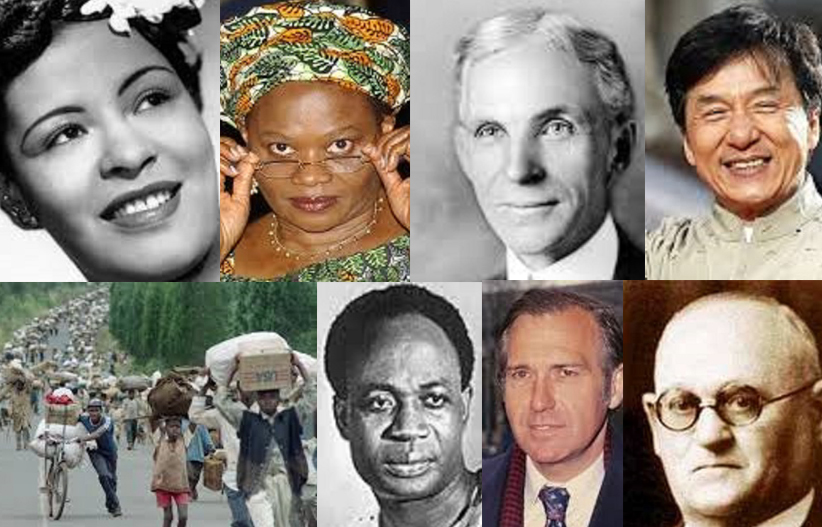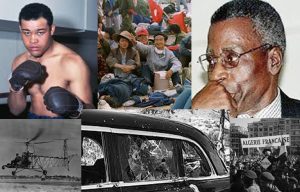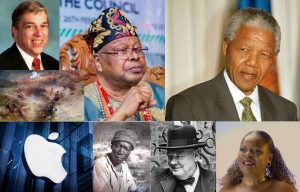
1724: Johann Sebastian Bach’s St. John Passion is premiered –
The sacred oratorio is the oldest extant Passion by the German composer. The highly popular work is a dramatization of the final days of Jesus Christ, according to the Gospel of John.
1739: Notorious highwayman Dick Turpin is hanged in York. On the day of his execution, Turpin becomes a celebrity: members of the public visit his cell to speak with him, apparently buying drinks from his jailer. He hires five professional mourners to follow him to the gallows.
1826: John Walker, a chemist in Stockton on Tees, discovered through a lucky accident that a stick coated with chemicals burst into flame when scraped across his hearth at home. He went on to invent the first friction match. Until the first half of the nineteenth century, the process by which fire was created was slow and laborious. Walker’s friction match revolutionised the production, application, and portability of fire. Walker sold his first “Friction Light” on the 12th of April 1827 from his pharmacy in Stockton on Tees. Walker’s first friction matches were made of cardboard but he soon began to use wooden splints cut by hand.

1938: The United States recognizes Nazi Germany’s conquest of Austria.
1947: Car manufacturer Henry Ford dies at age 83.

1947: Hundreds of Moroccans in Casablanca who had gathered to hear a speech about national independence from France are massacred on orders of their French army superior by Senegal soldiers with the Traileurs Senegalais corps of the French army, whom France had stationed in Morocco.
1948: The World Health Organization a specialized agency of the UN, was formally established. is established. The WHO is an agency concerned with fighting disease and epidemics worldwide, building up national health services, and improving health education in its 194 member states.

1954: US President Dwight D. Eisenhower in a news conference is the first to voice fear of a “domino effect” of communism in the Indo-China region.
1957: On a visit to France’s Colony, Cote d’Ivoire, Kwame Nkrumah, President of the newly independent Ghana, challenges all African countries to immediately declare their independence from colonial rule.

1963: A new Yugoslav constitution proclaims Tito the president for life of the newly named Socialist Federal Republic of Yugoslavia. Formerly known as Josip Broz, Tito was born to a large peasant family in Croatia in 1892.

1969: The internet is born. The Advanced Research Projects Agency (ARPA) awarded a contract to build a precursor of today’s World Wide Web to BBN Technologies. The date is widely considered as the internet’s symbolic birthday.
1976: MP John Stonehouse resigned from the Labour Party, leaving James Callaghan’s government in a minority of one. Stonehouse is best remembered for faking his suicide (20th November 1974), by leaving a pile of clothes on a Miami beach. He was presumed dead, and obituaries were published, even though nobody had been found. In reality, he was en route to Australia, hoping to set up a new life with his mistress and secretary, Sheila Buckley. He also faced 18 charges of theft, forgery, attempted insurance fraud, and conspiracy.

1982: All nine planets (including Pluto) lined up with the sun. In astrology, this spectacular event is known as syzygy (si-zuh-jee).
1990: An arson attack on the passenger ferry, Scandinavian Star, kills 159
Insurance fraud is today considered the most likely motive for the attack. According to a 2013 report, 9 crew members started the fire and sabotaged the fire crew’s attempts to extinguish the blaze.

1994: Violence erupts in Rwanda, foreshadowing genocide
Violence fuels the launch of what would become the worst episode of genocide since World War II: the massacre of an estimated 1 million innocent civilians Tutsis and moderate Hutus. Following the first wave of massacres, Rwandan forces managed to discourage international intervention with the murder of 10 Belgian peacekeeping officers. The Tutsis, a minority group that made up about 10 percent of Rwanda’s population, received no assistance from the international community, although the United Nations later conceded that a mere 5,000 soldiers deployed at the outset would have stopped the wholesale slaughter.

2000: South African cricket captain Hansie Cronje is charged by Delhi police with fixing One Day International matches against India.
2012: St Robert Catholic Church, Adamgbe, in Vandeikya Local Government Area of Benue State, caved in, leaving no fewer than twenty-two (22) persons dead, with thirty-five (35) others in critical condition.
2014: Dora Nkem Akunyili, a one-time Director General of the National Agency for Food and Drug Administration and Control (NAFDAC) of Nigeria died. Akunyili established as a top priority the eradication of counterfeit drugs and unsafe food. Before she assumed office in NAFDAC, fake and substandard foods and drugs were sold in Nigeria without any form of regulation.

Births on This Day, April 7
Jackie Chan, 70 years.
Chan Kong-sang also known as Jackie Chan is a Chinese martial arts actor, born on April 7, 1954
at Victoria Peak, Hong Kong. He is a producer, stuntman and singer also known for Hong Kong-produced martial arts films and Hollywood’s “Rush Hour: and its sequels.

Billie Holiday (April 7, 1915 -: July 17, 1959)
She was one of the greatest American jazz singers from the 1930s to the ’50s, was born.
Her name was Eleanora Fagan She was a professional musician nicknamed “Lady Day”, Holiday had a seminal influence on jazz and pop singing.
Her vocal style, strongly inspired by jazz instrumentalists, pioneered a new way of manipulating phrasing and tempo. She died from complications from cirrhosis of the liver at the age of 44.

Will Keith Kellogg (April 7, 1860 – October 6, 1951)
He was an American industrialist and philanthropist who co-founded the Kellogg Company, a multinational food manufacturing corporation known for its breakfast cereals. He is credited with popularizing cornflakes, a breakfast staple that has since become a global phenomenon.
In 1906, Will Keith Kellogg and his brother, Dr. John Harvey Kellogg, established the Battle Creek Toasted Corn Flake Company, which later became the Kellogg Company. Will Keith Kellogg was instrumental in developing innovative marketing strategies, including the use of extensive advertising campaigns and product giveaways, which contributed to the company’s rapid growth and success. He died at the age of 91.
Kindly like, comment, follow, and share.






















